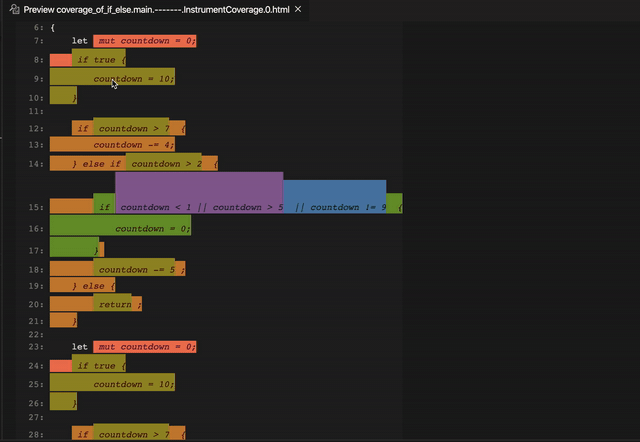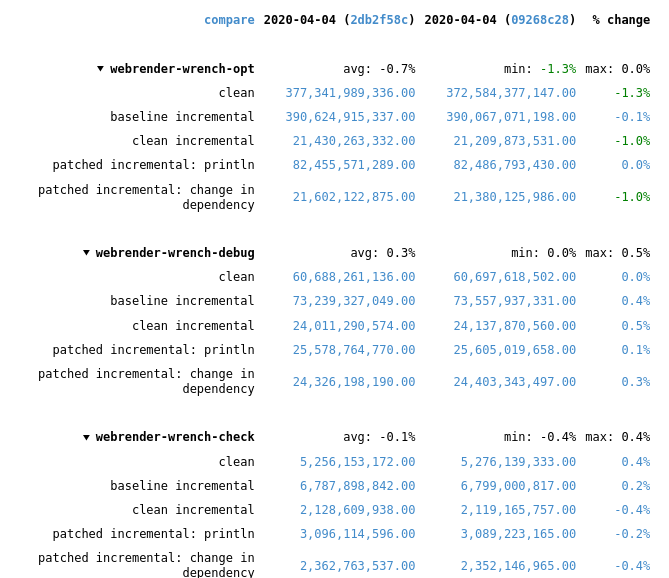- Preserve suffixes when displaying
- Rename test file to match `intra-link*`
- Remove unnecessary .clone()s
- Improve comments and naming
- Fix more bugs and add tests
- Escape intra-doc link example in public documentation
Tools, tests, and experimenting with MIR-derived coverage counters
Leverages the new mir_dump output file in HTML+CSS (from #76074) to visualize coverage code regions
and the MIR features that they came from (including overlapping spans).
See example below.
The `run-make-fulldeps/instrument-coverage` test has been refactored to maximize test coverage and reduce code duplication. The new tests support testing with and without `-Clink-dead-code`, so Rust coverage can be tested on MSVC (which, currently, only works with `link-dead-code` _disabled_).
New tests validate coverage region generation and coverage reports with multiple counters per function. Starting with a simple `if-else` branch tests, coverage tests for each additional syntax type can be added by simply dropping in a new Rust sample program.
Includes a basic, MIR-block-based implementation of coverage injection,
available via `-Zexperimental-coverage`. This implementation has known
flaws and omissions, but is simple enough to validate the new tools and
tests.
The existing `-Zinstrument-coverage` option currently enables
function-level coverage only, which at least appears to generate
accurate coverage reports at that level.
Experimental coverage is not accurate at this time. When branch coverage
works as intended, the `-Zexperimental-coverage` option should be
removed.
This PR replaces the bulk of PR #75828, with the remaining parts of
that PR distributed among other separate and indentpent PRs.
This PR depends on two of those other PRs: #76002, #76003 and #76074
Rust compiler MCP rust-lang/compiler-team#278
Relevant issue: #34701 - Implement support for LLVMs code coverage
instrumentation

r? @tmandry
FYI: @wesleywiser
Move:
- `src\test\ui\consts\const-nonzero.rs` to `library\core`
- `src\test\ui\consts\ascii.rs` to `library\core`
- `src\test\ui\consts\cow-is-borrowed` to `library\alloc`
Part of #76268
diagnostics: shorten paths of unique symbols
This is a step towards implementing a fix for #50310, and continuation of the discussion in [Pre-RFC: Nicer Types In Diagnostics - compiler - Rust Internals](https://internals.rust-lang.org/t/pre-rfc-nicer-types-in-diagnostics/11139). Impressed upon me from previous discussion in #21934 that an RFC for this is not needed, and I should just come up with code.
The recent improvements to `use` suggestions that I've contributed have given rise to this implementation. Contrary to previous suggestions, it's rather simple logic, and I believe it only reduces the amount of cognitive load that a developer would need when reading type errors.
-----
If a symbol name can only be imported from one place, and as long as it was not glob-imported anywhere in the current crate, we can trim its printed path to the last component.
This has wide implications on error messages with types, for example, shortening `std::vec::Vec` to just `Vec`, as long as there is no other `Vec` importable from anywhere.
specialize some collection and iterator operations to run in-place
This is a rebase and update of #66383 which was closed due inactivity.
Recent rustc changes made the compile time regressions disappear, at least for webrender-wrench. Running a stage2 compile and the rustc-perf suite takes hours on the hardware I have at the moment, so I can't do much more than that.

In the best case of the `vec::bench_in_place_recycle` synthetic microbenchmark these optimizations can provide a 15x speedup over the regular implementation which allocates a new vec for every benchmark iteration. [Benchmark results](https://gist.github.com/the8472/6d999b2d08a2bedf3b93f12112f96e2f). In real code the speedups are tiny, but it also depends on the allocator used, a system allocator that uses a process-wide mutex will benefit more than one with thread-local pools.
## What was changed
* `SpecExtend` which covered `from_iter` and `extend` specializations was split into separate traits
* `extend` and `from_iter` now reuse the `append_elements` if passed iterators are from slices.
* A preexisting `vec.into_iter().collect::<Vec<_>>()` optimization that passed through the original vec has been generalized further to also cover cases where the original has been partially drained.
* A chain of *Vec<T> / BinaryHeap<T> / Box<[T]>* `IntoIter`s through various iterator adapters collected into *Vec<U>* and *BinaryHeap<U>* will be performed in place as long as `T` and `U` have the same alignment and size and aren't ZSTs.
* To enable above specialization the unsafe, unstable `SourceIter` and `InPlaceIterable` traits have been added. The first allows reaching through the iterator pipeline to grab a pointer to the source memory. The latter is a marker that promises that the read pointer will advance as fast or faster than the write pointer and thus in-place operation is possible in the first place.
* `vec::IntoIter` implements `TrustedRandomAccess` for `T: Copy` to allow in-place collection when there is a `Zip` adapter in the iterator. TRA had to be made an unstable public trait to support this.
## In-place collectible adapters
* `Map`
* `MapWhile`
* `Filter`
* `FilterMap`
* `Fuse`
* `Skip`
* `SkipWhile`
* `Take`
* `TakeWhile`
* `Enumerate`
* `Zip` (left hand side only, `Copy` types only)
* `Peek`
* `Scan`
* `Inspect`
## Concerns
`vec.into_iter().filter(|_| false).collect()` will no longer return a vec with 0 capacity, instead it will return its original allocation. This avoids the cost of doing any allocation or deallocation but could lead to large allocations living longer than expected.
If that's not acceptable some resizing policy at the end of the attempted in-place collect would be necessary, which in the worst case could result in one more memcopy than the non-specialized case.
## Possible followup work
* split liballoc/vec.rs to remove `ignore-tidy-filelength`
* try to get trivial chains such as `vec.into_iter().skip(1).collect::<Vec<)>>()` to compile to a `memmove` (currently compiles to a pile of SIMD, see #69187 )
* improve up the traits so they can be reused by other crates, e.g. itertools. I think currently they're only good enough for internal use
* allow iterators sourced from a `HashSet` to be in-place collected into a `Vec`
The InPlaceIterable debug assert checks that the write pointer
did not advance beyond the read pointer. But TrustedRandomAccess
never advances the read pointer, thus triggering the assert.
Skip the assert if the source pointer did not change during iteration.
Often when modifying compiler code you'll miss that you've changed an API used
by unit tests, since x.py check didn't previously catch that.
It's also useful to have this for editing with rust-analyzer and similar tooling
where editing tests previously didn't notify you of errors in test files.
rustdoc: do not use plain summary for trait impls
Fixes#38386.
Fixes#48332.
Fixes#49430.
Fixes#62741.
Fixes#73474.
Unfortunately this is not quite ready to go because the newly-working links trigger a bunch of linkcheck failures. The failures are tough to fix because the links are resolved relative to the implementor, which could be anywhere in the module hierarchy.
(In the current docs, these links end up rendering as uninterpreted markdown syntax, so I don't think these failures are any worse than the status quo. It might be acceptable to just add them to the linkchecker whitelist.)
Ideally this could be fixed with intra-doc links ~~but it isn't working for me: I am currently investigating if it's possible to solve it this way.~~ Opened #73829.
EDIT: This is now ready!
The optimization meant that every extend code path had to emit llvm
IR for from_iter and extend spec_extend, which likely impacts
compile times while only improving a few edge-cases
the test was sized to match external iteration only, since
vec's in-place collect now uses internal iteration we collect into
a different type now.
Note that any other try-fold based operation such as count() would also
have exceeded the type length limit for that iterator.